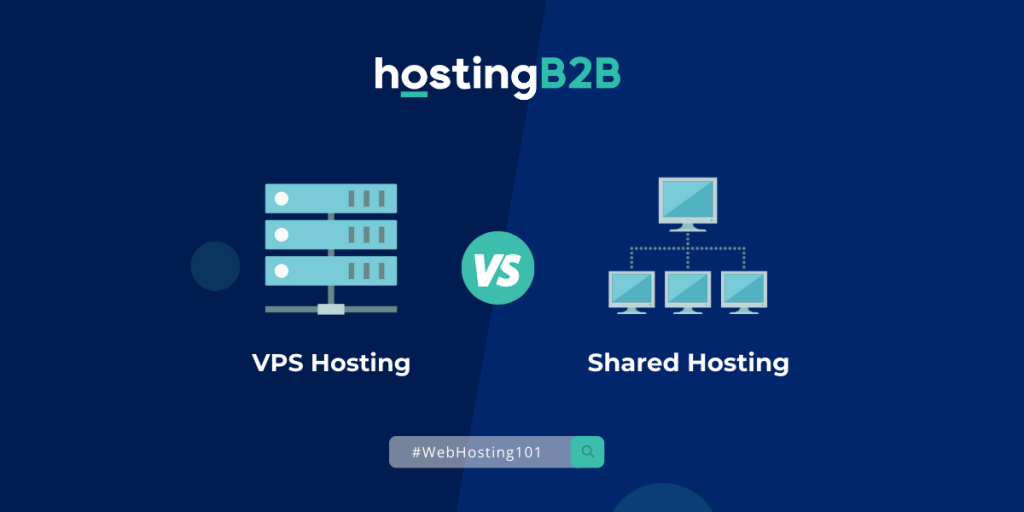Shared vs. VPS Hosting: Which Option Is Best for You?

Are you a small business owner who has been relying on social media accounts as your primary online presence? While this is a suitable temporary solution, it could potentially restrict your ability to expand your brand’s reach in the long run.
If you’re interested in growing your business’s online footprint, it might be the right time to elevate your strategy by creating a website.
Developing a dedicated website for your business not only enhances your online presence but also enables you to reach a broader audience. However, before you can start building your website, you need to select a hosting plan.
The hosting plan you choose will act as the foundation for your website, so it’s important to select one that offers the necessary features for both your current and future needs.
There are two primary types of hosting you should consider: VPS and shared hosting. Let’s explore the distinctions between them and examine various use cases to help you determine the best hosting option for your business site.
What is Shared Hosting?
Shared hosting is a basic type of web hosting in which multiple customers utilize the same server to host their websites.
As the name suggests, all websites share common resources such as hard disk storage, computing power, RAM, bandwidth, and database server.
You can draw a comparison between shared hosting and a hostel. In a hostel, customers share a room, and there is a limited number of beds available. The room represents the shared server, and each bed represents a customer’s website.
For certain travelers, a hostel is a favorable choice because it allows them to save money and they don’t mind sharing their sleeping space with others. Similarly, shared hosting caters to customers who have budget constraints and do not require advanced features provided by more expensive plans like VPS or dedicated hosting.

The advantages of Shared Hosting
- Cost-effective: Shared hosting is a more affordable option, particularly for those with a limited budget, compared to dedicated or VPS hosting.
- Beginner-friendly: Shared hosting doesn’t require complex configurations or advanced technical knowledge, making it ideal for first-time website owners.
- Low maintenance: The hosting provider takes care of most management and maintenance tasks related to the shared hosting servers. This allows you to focus on running your website rather than dealing with server updates or security patches.
The disadvantages of Shared Hosting
- Performance limitations: Shared hosting allocates limited server resources among multiple websites, which can affect your website’s performance, especially during periods of high traffic.
- Increased security risks: Shared hosting plans carry a higher risk of malware attacks spreading from one compromised website to others. Following best practices for website security helps mitigate these risks.
- Limited customization: With shared hosting, you lack root access to the server, preventing you from performing administrative tasks like software installation or server updates on your own.
What is VPS Hosting?

Virtual private server (VPS) hosting offers greater flexibility compared to shared hosting. In VPS hosting, each customer is provided with an independent space on the server known as a virtual machine. This virtual machine has its own dedicated set of resources that can be utilized for hosting websites.
While multiple websites may reside on the same physical server, each website operates within a unique environment that can be customized according to the user’s requirements.
VPS hosting grants you access to your own operating system, dedicated server resources, and root access, enabling you to install any software and tailor the server to your preferences. It closely resembles dedicated hosting, except it utilizes virtual machines to emulate individual physical servers for each customer.
The advantages of VPS Hosting
- Enhanced control: VPS hosting grants you a higher level of control over your website’s infrastructure. With root access to the server, you can install custom software, add user accounts, and have more autonomy over the server configuration.
- Cost-effectiveness: VPS hosting is a more affordable option compared to dedicated hosting plans, which can be quite expensive. Despite its budget-friendly nature, VPS hosting offers many similar features to dedicated hosting, making it a popular choice for individuals and small businesses.
- Improved performance: VPS hosting utilizes advanced server hardware, resulting in faster and more efficient resource allocation for your web projects. Furthermore, since the allocated resources are solely dedicated to your website, you have the flexibility to partition them as needed.
The disadvantages of VPS Hosting
- Technical knowledge required: To fully leverage the benefits of VPS hosting, prior experience in web hosting is beneficial. This may increase the cost of your hosting package if you need to hire experts with the necessary skills to manage the virtual machine.
- Increased maintenance responsibility: Unlike shared hosting, where the hosting provider handles maintenance tasks, you are responsible for ensuring the smooth operation of your VPS. If any issues arise, it will primarily be your responsibility to identify and resolve them.
When to choose Shared Hosting
If the following conditions apply to you, shared hosting is worth considering:
- You are new to web hosting and have limited technical knowledge, and you prefer not to commit to a higher-priced plan.
- You are in the early stages of developing an online business.
- You own or intend to create a small website or blog that does not require significant storage space or bandwidth.
- Your budget constraints prevent you from making long-term investments in web hosting.
- You prioritize ease of use and affordability over site performance and customization options.
When to choose VPS Hosting
If the following factors apply to your situation, VPS hosting is a suitable choice:
- You operate a medium or large-sized business that receives a significant number of daily orders.
- You have an IT team capable of managing the setup and maintenance of a virtual server.
- Your business is in a growth phase, and you anticipate continued expansion in the foreseeable future.
- Your website experiences high levels of web traffic and requires ample disk space and bandwidth to accommodate it.
- You run web applications that require full control over your hosting server.
- You prioritize superior performance and robust website security over affordability and simplicity.
- You have a substantial budget and can commit to the higher costs associated with VPS hosting.
So, those are the distinctions between VPS and shared hosting. In most cases, shared hosting is suitable for individuals or smaller businesses seeking simplicity, practicality, and affordability, prioritizing these aspects over enhanced website performance and customizable infrastructure.
Conversely, medium and large-sized businesses, as well as individuals with advanced technical knowledge, will find value in the control, security, and scalability provided by VPS hosting.
By assessing the features of each hosting type and how well they align with your specific requirements, you will be able to make an informed decision for your next website.
Why Hostingb2b Solutions ? Contact us TODAY to find out!
Here are some of the other services we provide here At HostingB2B:
Recommended Posts

Top 10 Benefits of HostingB2B’s Managed IT Services
June 28, 2024



